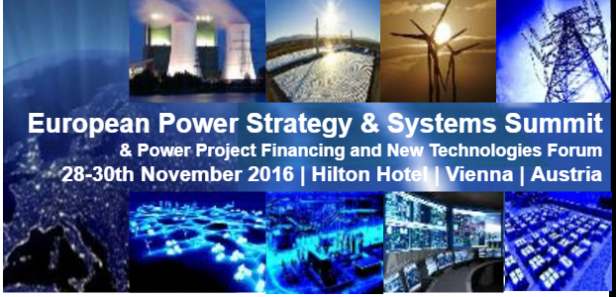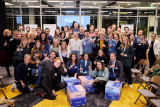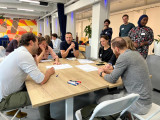The European Power Systems Strategy, Design, Technology and Financing Summit
POWER 2016 Conference


The European Power Systems Strategy, Design, Technology and Financing Summit
Get notified about new updates, opportunities or events that match your interests.

Ben jij thuis in de wereld van communicatie en event management? En gaat jouw hart sneller kloppen van duurzaamheid, stedelijke innovatie en netwerken?
Kom dan als junior Communicatie- en Programmamedewerker het team van Amsterdam Smart City versterken!
Amsterdam Smart City is een onafhankelijk innovatieplatform, dat innovatieve bedrijven, kennisinstellingen, maatschappelijke organisaties, overheden en proactieve bewoners samenbrengt en de stad van de toekomst vormgeeft. Amsterdam Smart City maakt als programma deel uit van Amsterdam Economic Board.
Samen met 29 partners werken wij aan een betere, duurzame en toekomstbestendige wereld. Daarnaast brengen we een internationale community samen van meer dan 9.000 innovatieprofessionals, studenten en geïnteresseerden. Zij ontmoeten elkaar rond verschillende thema’s en helpen elkaar verder. Door al deze partijen te verbinden, en met hen het gesprek te voeren over de grote uitdagingen in onze regio, komen we tot nieuwe verhalen en innovatieve oplossingen die bijdragen aan betere straten, buurten en steden. We richten ons met name op vier transitiethema’s: Mobiliteit, Digitaal, Energie en Circulair.
Hier staan wij voor
Iedereen is anders, en juist met verschillende mensen werken wij nog beter aan de metropool van morgen. We zijn nieuwsgierig naar jouw talenten, wat jou bijzonder maakt. We horen graag jouw ideeën en perspectieven. Dat helpt ons om samen nog meer impact te maken.
Je beheert onze online kanalen en je organiseert samen met het team evenementen. Met verslaglegging, enthousiasme en het maken van nieuwe connecties binnen ons netwerk versterk je ons regionale en internationale netwerk! Je werkt nauw samen met- en ondersteunt het hele Amsterdam Smart City team en de programmadirecteur. Dit zijn je taken:
Beheer en schrijven van onze wekelijkse nieuwsbrief en LinkedIn content. Je neemt initiatieven om de interactie en het bereik te vergroten.
Je houdt toezicht op de berichten op het online platform en je stimuleert leden om content te plaatsen
Beheer info mailbox (inkomende verzoeken, vragen etc.)
Ondersteuning inhoudelijke verslaglegging netwerkevenementen en werksessies, en het opmaken van presentaties
Praktische ondersteuning bij evenementen (locaties, uitnodigingen, communicatie)
Ondersteuning bij het organiseren van werksessies en het bouwen van coalities
Je hebt wo/hbo werk- en denkniveau, een opleiding in de richting van communicatie (of vergelijkbaar);
Je hebt 1-2 jaar werkervaring en ervaring op het gebied van online communicatie/community en/of event management
Je beheerst de Nederlandse en Engelse taal uitstekend in woord én geschrift
Je hebt affiniteit met duurzaamheid, innovatie en stedelijke ontwikkelingen en je vindt het belangrijk om met je werk maatschappelijke impact te maken.
Je beschikt over voldoende algemene kennis over bovenstaande en je kan hier helder over schrijven.
Je bent proactief en nieuwsgierig
Je bent sociaal, enthousiast en houdt van netwerken en verbinden.
Wij bieden je een fijne werkplek op het Marineterrein in Amsterdam, met een informele en collegiale sfeer. We zijn een klein team dat nauw met elkaar en onze partners samenwerkt.
Je wordt deel van een enorm divers en dynamisch netwerk van koplopers en pioniers in stedelijke innovatie van toonaangevende organisaties in de Metropool Amsterdam. Er is veel ruimte om te leren van collega’s en specialisten uit het netwerk en je te verdiepen in de thema’s die jou interesseren. Samen leren we door te doen!
Daarnaast bieden wij:
Een functie voor 32 uur per week;
Een half-jaar-contract met uitzicht op verlenging;
Salarisindicatie €3.300 - €3.500 bruto per maand (o.b.v. 40 uur), aangevuld met vakantie- en eindejaarstoeslag.
Ben je enthousiast? Dan horen we graag van je! Stuur je CV en een korte motivatie uiterlijk 4 april per mail aan solliciteren@amecboard.com. De eerste gesprekken vinden plaats op 10 en 12 april. Vervolggesprekken zijn in de ochtend van 19 april. Een schrijfopdracht maakt deel uit van de procedure. Neem voor meer informatie over de functie contact op met Pelle Menke. Hopelijk spreken we elkaar snel!

On Thursday December 14th, Amsterdam Smart City partners concluded 2023 with an afternoon full of inspiration, exchange and connections at our 22nd Demoday! Our partner Deloitte welcomed our network in The Garage, where their ‘Deloitte Studios’ department is located. In this article, we’ll give you a quick overview of the Knowledge Session, Work Sessions and Pitches. Interesting in learning more? Read the full reports by our Programme Managers Noor, Pelle and Sophie (linked below).
The Demodays are one of the tools we use to stimulate innovation and encourage connection between our partners and community. The purpose of the Demodays is to present the progress of various innovation projects, ask for help, share dilemmas and involve more partners to take these projects to the next level. More information about the Demodays can be found here.
To kick-off our final Demoday of 2023, our brand-new partner Hieroo led an inspiring knowledge session about the change method they use for social innovation in the city: Theory U. Dorien Schneider and Maartje Krijnen taught us more about this methodology and how it can help us solve complex problems by shifting from ego to eco-thinking. Read the full report here.
After the plenary Knowledge Session we split up in different worksessions, each exploring regional innovation challenges. As always, we had set up the sessions’ topics and moderation in collaboration with our partners.
Mobility | Decision-making along the principles of Inclusive Prosperity – Jurhan Kwee (Municipality of Amsterdam)
In The Netherlands, the concept of ‘Inclusive Prosperity’ is on the rise. Policy makers are busy defining this concept, figuring out how to put this concept into practice and what it means for their decision-making process. Together with his colleagues at the Municipality of Amsterdam, Yurhan Kwee hosts sessions on decision-making along the principles of Inclusive Prosperity. With the input he gathers, he hopes to make the decisions needed for our Inclusive Prosperity ambitions more understandable and transparent, both for Amsterdam’s administrators and councillors as well as its citizens. Read Pelle’s recap article here.
Digital | Data Commons Collective: Using data for a liveable city – Lia Hsu (Amsterdam Economic Board) and Simone van der Burg (Waag)
In the big tech-dominated era, data has been commercially exploited for so long that it is now hard to imagine that data sharing might also benefit the community. Yet that is what a collective of businesses, governments, social institutions and residents in Amsterdam aim to do. Sharing more data to better care for the city. On behalf of the Data Commons Collective, Lia Hsu (Strategic Advisor at Amsterdam Economic Board) asked the Amsterdam Smart City network for input and feedback on their Data Commons initiative. Read Sophie's recap article here.
Energy | How can we continue to facilitate the homeowner in driving the energy transition? | Wouter van Rooijen (Alliander)
Wouter van Rooijen (Alliander) discussed the challenges related to grid congestion. From 2030 onwards, it is expected that a significant portion of the low-voltage network will experience both over- and under-voltage. While the network will be reinforced as quickly as possible, the lack of labour capacity is also prompting the consideration of alternative solutions.
The solution that emerged from Wouter's co-creation process was WijkWise. In this work session, Wouter aimed to validate the WijkWise concept and find parties that could contribute to its development and market implementation. Dave van Loon from Kennisland moderated the session. Read Noor’s recap article here.
Circular | Navigating eco-emotions: The impact of working in sustainability on your mental wellbeing| Marian Zandbergen (Hogeschool van Amsterdam)
This work session, led by Marian Zandbergen (CIRCOLLAB, HvA) and moderated by Mareille de Bloois (Royal HaskoningDHV), explored the challenges and opportunities associated with eco-emotions, both personally and within organizations. The key question addressed was: How can individuals and organisations constructively manage eco-emotions, and what implications does this have for organisations? Read Noor’s recap article here.
To end this festive afternoon and the year 2023 as a whole, we invited project owners and -members to present their progress and next steps on topics brought in during our events and deep-dives throughout 2023. The following projects were presented. You can read more about these topics on their dedicated articles and project pages, linked below.
Local Energy Systems: Where we started, what we have achieved, and what are the next steps – Omar Shafqat (University of Applied Sciences Amsterdam)
Connecting the resource- and energy transition – Edwin Oskam (MRA)
ChatGPT and the government: Possibilities and impact on our work – Jeroen Silvis (Province of North Holland)
Floating urban districts: Future-proof living in the Metropolitan Region – Joke Dufourmont (AMS Institute)
Mobility Justice: Raising the topic of Mobility Poverty and the working group’s progress – Bas Gerbrandy (Province of North Holland)
Our next Demoday will take place in April. Do you have an inspiring story or project you want to pitch to the Amsterdam Smart City network? Let us know via sophie@amsterdamsmartcity.com

When working together on transitions, it is important to be aware of and sensitive to the impact of power and systemic oppression in participatory processes. Within the Amsterdam Smart City network, the question of inclusion and civic participation, is often brought up in worksessions and discussions. However, we often lack the tools to find the bottlenecks and really include all important beneficiaries.
Therefore, we asked our valued partners Kennisland and DRIFT to lead a workshop about Power in Transitions at Demoday #20 on May 16. Dave van Loon and Faduma Mukhtar (Kennisland) together with Aron Teunissen (DRIFT) taught the participants more about power in transitions, based on the Power Literacy Framework and Field Guide from Kennisland. This guide describes five different forms of power and offers a set of tools for professionals to become more aware of power dynamics in their work.
According to the Power Literacy Guide by Kennisland, there are five forms of power in design process. If you want to learn more about this, you can download the Power Literacy guide here. The five forms of power are:
Privilege: The type of power you get from a social relation whereby you benefit due to the social group you belong to, at the expense of another social group. It is an unearned advantage and often invisible to those who have it.
Access power: The ability to influence who is included in and excluded from the design project and process.
Goal power: The ability to initiate the design project to begin with, as well as the ability to influence decisions related to framing the problem, goals, and structure of the design process.
Role power: The ability to influence the roles that different stakeholders take on. This includes the ability to assign any roles or titles in the design process, as well as influencing the role each stakeholder plays in making decisions.
Rule power: The ability to influence the way that those in the design process will work together. It includes the ability to influence what is considered normal, what is allowed and what isn’t, how actors will communicate with each other, what language is used, and beliefs about what types of knowledge are valid.
After a theoretical introduction of the five forms of power, we split into smaller groups to perform a so-called power check for different Amsterdam Smart City projects, such as the Mobility Challenge and “Wat mensen beweegt”. Using this power check, the participants looked at access power and goal power. We identified all actors affected by the project and indicated which actors were not involved. The different actors were then assigned a role in different stages of the process: listener, co-creator, advisor, partner or director.
The goal of this exercise was to create more awareness about involving target groups in different stages of the project. The main take-aways were:
The role for the for the ‘benefit group’, the people that are impacted by the project, is often too small. If beneficiaries are involved, this often happens in the last stages of the project. In this phase in the project, it is often more difficult or not possible at all to influence decision-making;
To create equal power, some parties have to ‘give away’ (some of) their power;
Truly inclusive work takes time, effort and money. It is not something takes place overnight;
Awareness is half of the battle: make the topic of systemic oppression in participatory process a structural part of your (work)process).
Want to learn more about power in transitions? Read more.

